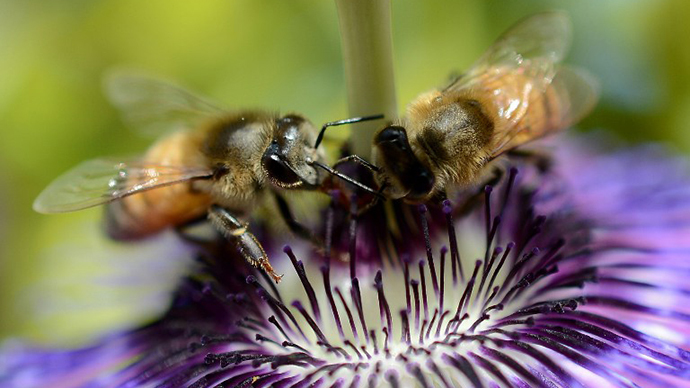50,000 dead Oregon bees to be honored in memorial service

A Portland resident is creating quite the buzz by hosting a memorial ceremony dedicated to the 50,000 bumblebees that died in an Oregon parking lot last week.
Just days before National Pollinator Week, tens of thousands of bees fell from the trees and were found dead at a Target parking lot in Wilsonville, Ore. A state investigation found that an insecticide coined “Safari” was to blame, and Oregon now has a 180-day ban of 18 pesticides containing the chemical dinotefuran.
More than 50 poisoned European linden trees have been covered with netting to prevent further bee deaths, and the Oregon State Agricultural Department is still investigating whether or not there was a violation of state or federal pesticide laws.
Meanwhile, Portland resident Rozzell Medina is hosting a memorial to commemorate the bumblebees. The July 30 event will take place in the Target parking lot to “memorialize these fallen lifeforms and talk about the plight of the bees and their importance to life on Earth,” Medina wrote on the event’s Facebook page. There will be food available for attendees.
“I thought it would be a good opportunity for people to see that this is not just a news item,” Medina told The Oregonian. “With a lot of these ecological catastrophes, they become so abstract that people become scared to feel them.”
The number of bee deaths marks the world’s largest recorded mass die-off of bumblebees. Scientists intiailly estimated that 25,000 bees died in Wilsonville, but that figure doubled after a more accurate assessment, executive director of the Xerces Society Scott Hoffman Black told the Los Angeles Times.
Last week, a second, but smaller mass die-off occurred in Hillsboro, Ore. City officials estimated that at least 100 bees died beneath a linden tree in the downtown area. Investigators linked the Safari insecticide to both the Hillsboro and the Wilsonville die-offs.
Bees are crucial pollinators, and their decline is posing a dangerous threat to the US agriculture industry. The honeybee population has suffered annual death rates of 30 percent, and about 10 million bee hives have been lost since 2006. The US Department of Agriculture coins this phenomenon the Colony Collapse Disorder, and has warned that the US may not be able to meet its pollination demands to sustain its homegrown crops this year.
Medina, who earned his master’s in leadership and sustainability education from Portland State University, believes that Americans need to understand what the bee deaths mean in the long run, particularly for the agriculture industry.
“This isn’t a funeral,” he told the LA Times. “We’re not there to bury the bees or build little bee coffins. We’re going there to talk about what this means.”














